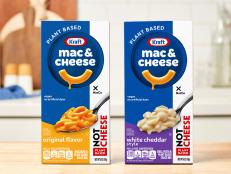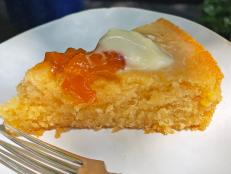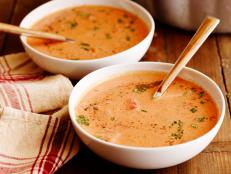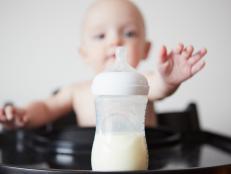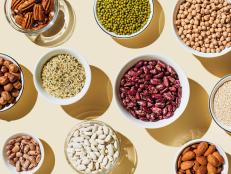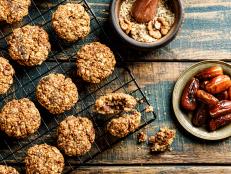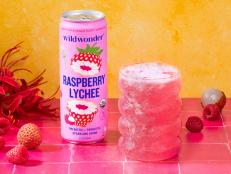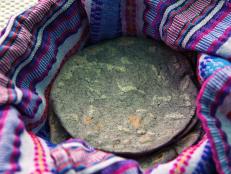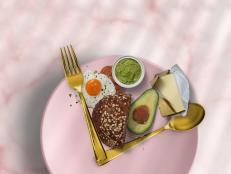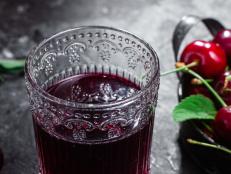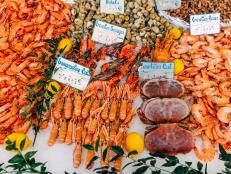Ever Wanted to Know More About Fruitarians?
Living on raw fruit does sound appealing, but let's get real.

cheche22
While mango smoothies and peanut butter on apples for every meal do sound delicious, man cannot live on peanut-butter-on-fruit alone. In fact, Ashton Kutcher's attempt at the diet landed him in the hospital.
The fruitarian diet is an extremely restrictive diet whose followers generally eat only fruit. There is no official definition of this diet, and there are no specific rules on how to follow it. It's actually pretty difficult to find info on it, without following individual Instagrammers who make up their own specs.
But in general, the fruitarian diet is a subcategory of the vegan diet. The fruitarian diet includes raw fruit and some nuts and seeds; it doesn't include processed or cooked food.
Some fruitarians eat from only one of the following "food groups" at a time — think only acid fruits for breakfast or only dried fruits for dinner. Interestingly, in this diet fruits aren't categorized into common fruit categories like stone fruits, tropical fruits, citrus, berries and melon.
Instead, fruitarian food groups include:
- Acid fruits: grapefruit, oranges, lemons, limes
- Sub-acid fruits: apples, apricots, cherries
- Sweet fruits: bananas, guava, mango, grapes
- Dried fruits: prunes, figs, raisins
- Nuts
- Seeds
- Oily fruits: olives, avocados, coconuts
The Academy of Nutrition and Dietetics states in its position paper on vegetarian diets that while appropriately planned vegan diets can be healthful, fruitarian diets are lacking in protein. Without enough protein, the body cannot repair, build tissue or heal wounds properly. Olives, avocados, coconuts, nuts and seeds provide some protein, and all fruits provide trace amounts of protein, but it would be difficult to get the recommended amount of protein from a fruitarian diet. The seeds and nuts that contain the highest amount of protein include hemp seeds, with 10 grams in 3 tablespoons, and almonds, with 7 grams of protein in 23 almonds.
In addition, fruitarians are at risk for the following deficiencies:
Vitamin B12 — This vitamin is needed to make red blood cells and use fats and amino acids. And while a deficiency isn't likely in the short run (as you need very little daily), over time a deficiency can result in anemia and severe, irreversible nerve damage. Vitamin B12 is found only in animal products.
Vitamin D — Calcium and phosphorus, to be deposited in bones and teeth, cannot be properly absorbed without vitamin D. Some fruitarians may drink vitamin D-fortified orange juice.
Calcium — Known best as a bone builder, calcium also helps muscles and nerves work properly and blood to clot. Rhubarb, okra (yes, it's officially a fruit), dried figs and a few other fruits have minimal amounts of calcium, as does calcium-fortified orange juice.
Iron — Vegans can get this important nutrient from legumes, whole grains, tofu and some dark leafy greens. Fruitarians risk iron-deficiency anemia, as some of their only sources of iron are dried apricots, prunes and raisins.
Zinc — This mineral is essential for rebuilding and repairing body cells. It's also necessary for energy production, which is why people who are deficient in zinc and iron feel fatigued. It can be found in many nuts and seeds.
And while there's a small chance of becoming an Instagram star, most fruitarians may not have considered these other consequences:
Social isolation — Not many restaurants or work lunches have a fruit menu. Fruitarians may find themselves dining solo or eating a lot of fruit cups — where any yogurt and granola will probably have to be scraped off.
Not eating seasonally — Even though avocados are green and so are apples, the fruitarian diet isn't exactly green for the earth. Depending on where you live, your fruit may have to be trucked in from around the globe, especially if you want that tropical guava in winter. While frozen fruit is a much greener option, most fruitarians choose only fresh fruit — which is actually a shame, since most frozen fruit, which is picked at the peak of freshness, is often higher in nutrients than fresh.
Serena Ball, MS, RD, is a registered dietitian nutritionist, food writer and recipe developer. She blogs at TeaspoonOfSpice.com and is the author of the best-selling The 30-Minute Mediterranean Diet Cookbook. Follow her @TspCurry on Twitter and Instagram.
Related Stories:


























